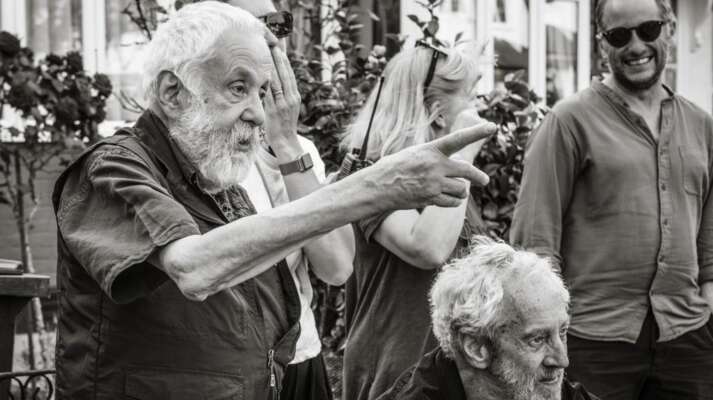The Latin American Wave
Disobedience's Chilean Director Sebastián Lelio is the most recent talented filmmaker from Latin America
The Latin American Wave
Written by Peter Bowen
With Disobedience, Sebastián Lelio joins a wave of Latin American filmmakers who have applied their talents to making English-language films. On the night that Lelio won the Academy Award for Best Foreign Film for A Fantastic Woman, another Latin American director, Guillermo del Toro, won Best Director and Best Picture. Producer Frida Torresblanco wanted Lelio to helm Disobedience largely based on his Spanish-language films, such as his 2013 film Gloria. "Sebastián was the only person who could do something like this because he has such an extraordinary sensibility," explains Torresblanco. "He understands women so well and connects with them on such a profound level." Lelio was drawn both to the material and the cast. "Having three extraordinary actors [Rachel Weisz, Rachel McAdams, and Alessandro Nivola] in the film's key roles gave the film its quiet energy," says Lelio. "The interaction between their characters creates great cinematic tension." Indeed Lelio finds the plight of his characters to be both timely and universal. "I feel like their confrontation resonates strongly with what we're going through today as a human society around the world," explains Lelio. To mark Lelio's English-language debut, we look back at other remarkable Latin American filmmakers who work in both Spanish and English.

Alfonso Cuarón | Mexico
Born and raised in Mexico City, Alfonso Cuarón studied filmmaking at CUEC (Centro Universitario de Estudios Cinematográficos) before working in various capacities (editor, cinematographer, assistant director) in the Mexican film industry. At 31, Cuarón directed his first feature, the sex comedy Sólo Con Tu Pareja—changed to Love in the Time of Hysteria in English-speaking markets—which caught the eye of Hollywood. Sydney Pollack, who was executive producing Showtime's Fallen Angels, tapped him to direct an episode, a gig that lead to Cuarón helming two Hollywood films. In 1995, he directed an adaption of the beloved children's novel A Little Princess, and three years later he brought to the screen another literary classic, Great Expectations. But it was Cuarón's return to Mexico and his native tongue that launched his first breakout masterpiece. His 2001 Y Tu Mamá También with Gael García Bernal and Diego Luna as two sex-obsessed teenage boys on a road trip with an older woman (played by Maribel Verdú) woke up many critics and audiences. For fellow Mexican director Alejandro González Iñárritu, "It's about us, about our country. That's a childhood we all share." Noting its place in the "resurgence of Mexican cinema," Rolling Stone's Peter Travers writes, "Cuarón's hot-blooded, haunting and wildly erotic film revels in the pleasures of the flesh without losing touch with thought and feeling." While Cuarón has moved on to make a range for films, from childhood fantasy with Harry Potter and the Prisoner of Azkaban to science fiction with Gravity (for which he won the Best Director Academy Award), Cuarón never loses touch with his Mexican heritage and spirit.

Alejandro González Iñárritu | Mexico
After growing up in Mexico City, Alejandro González Iñárritu took off as a teenager to become a citizen of the world, traveling extensively through Africa and Europe. But he returned to Mexico to become a filmmaker. He would later tell The AV Club, "Those years shaped me a lot and taught me the value of exploring different things." In college, Iñárritu was hired as a DJ at a popular Mexico City radio station, a gig that eventually led to his making commercials and his first feature, Amores Perros, a multi-layered narrative of three different stories connected by a car accident. Winning the Critics Week at the Cannes Film Festival and receiving a nomination for the Academy Award for Best Foreign Language Film, this hard-hitting look at life in Mexico City put Iñárritu on the map. The New York Times' Elvis Mitchell exclaimed, "Amores feels like the first classic of the new decade, with sequences that will probably make their way into history." While his next film, 21 Grams, marked his English-language debut, his future work, especially with Babel and Biutiful, express his global perspective. In 2014, Iñárritu hit his stride, winning the Academy Award for Best Director for two years in a row—in 2014 for Birdman and in 2015 for The Revenant. Iñárritu told The New York Times, "the best American movies about American society have been made by foreign directors." At the time, he was talking about Ang Lee's The Ice Storm, but he could have just easily have been referring to himself.

Fernando Meirelles | Brazil
Brazilian director Fernando Meirelles entered cinema through architecture. After making a film for his thesis at the University of São Paulo's School of Architecture and Urban Planning, he eventually dropped his design career to pursue one making movies. In 2002, Meirelles captured the world's attention with City of God, a propulsive tale of life in Rio's favelas. Roger Ebert was blown away, writing, "Breathtaking and terrifying, urgently involved with its characters, it announces a new director of great gifts and passions: Fernando Meirelles. Remember the name." Meirelles' next film, an adaptation of John le Carré's The Constant Gardener, not only garnered him critical raves and a nomination for a Best Directing Academy Award, but a thumbs up from the book's author. For le Carré, Meirelles as a Brazilian was the perfect director to bring to life his tale of corporate corruption in Africa. "Fernando brought to it a third-world view. From the moment he was aboard, the story was about the victim rather than the perspective I had in the novel," le Carré told The Guardian.

Pablo Larraín | Chile
As part of the emerging Chilean film movement, Pablo Larraín has taken on a range of roles. In 2003, Larraín set up the production company Fabula with his brother, which helped make a number of Chilean films, including Sebastián Lelio's Gloria and A Fantastic Woman. As a director, Larraín has explored the enduring legacy of the Pinochet period. His 2008 Tony Manero is a chilling character study of a man in 1978 so obsessed with John Travolta's character in Saturday Night Fever that he will go to any length to live out his fevered dream. His 2012 critically acclaimed No—which was nominated for an Academy Award for Best Foreign Film—follows an advertising company that successfully deploys Madison Avenue tactics to push for a "No" vote against Pinochet staying in power. After making a name for himself as a brilliant dissector of the Chilean psyche, Larraín was surprised to get a call from Darren Aronofsky about directing Jackie, a portrait of one of America's most beloved First Ladies. Larraín remembers Aronofsky telling him that he wanted "to have somebody who was not American looking at this with some distance and just connecting with the key of the story, which are her emotions and her path." Aronofsky's instincts proved right on target. Larraín's English-language film with Natalie Portman as the cherished first lady not only won critical acclaim, but was nominated for three Academy Awards. "More than merely offering a backstage pass to history, Larraín draws us into the utter uniqueness of a situation where personal loss and national duty collided so violently," notes NPR.

Guillermo del Toro | Mexico
Guillermo del Toro, who recently won a Best Director Academy Award for The Shape of Water, is among the most commercial and well known of the Latin America wave. As a child in Guadalajara, Mexico, del Toro was infatuated with American horror and fantasy films, an obsession that pushed him to make many Super 8 films while still a boy. After film school, del Toro started his own effects house, honing his craft for over a decade. His hard work paid off when his 1993 horror film Cronos became a critical favorite. Tapped to make his first English-language film Mimic, del Toro's experience with Miramax's Harvey Weinstein proved so onerous that he later acknowledged, "My first American experience was almost my last." Indeed while del Toro would continue to make highly acclaimed English-language genre films, like Blade II and Hellboy—and later blockbusters like Pacific Rim—he would also return to working in Spanish. It was his 2006 Spanish-language film Pan's Labyrinth, a fantastical tale set in Franco's Spain, which first showed many his brilliant ability to mix fantasy with politics. Nominated for six Academy Awards, and winning three, the film became an instant classic. Roger Ebert proclaimed, "Pan's Labyrinth is one of the greatest of all fantasy films, even though it is anchored so firmly in the reality of war." In 2007, del Toro joined his fellow Mexican directors Alfonso Cuarón and Alejandro González Iñárritu to create Cha Cha Cha Films. But far from a competitive production arm, Cha Cha Cha reflected the love the three directors had for each other and for film in general. Del Toro told The New York Times, "There is nothing, no big company that ties us together, other than our friendship."

Patricia Riggen | Mexico
Patricia Riggen grew up in Guadalajara, working as a journalist, a film researcher, and a producer, but never a film director. "When I was growing up in Mexico there weren't any women directors around for me to see that it was something I could do," Riggen told Women and Hollywood. To follow her dream, Riggen moved to New York City to get a MFA in film at Columbia University. In recent years, more and more women directors have gained acclaim and attention throughout Latin America. Argentinean director Lucrecia Martel's films, including The Holy Girl and The Headless Woman, have made her one of the most admired auteurs working today. After seeing her 2001 breakout film La Ciénaga, Pedro Almódovar told IndieWire, "It was an epiphany. When you discover an auteur so original, mature and elusive as Lucrecia Martel, you feel as if you're witnessing a miracle." Riggen found a way to tell stories about her culture by working north of the border. Her 2017 Under the Same Moon—which originally started out at a Hollywood studio—is a mostly Spanish-language film about a Mexican mother and child on opposites sides of the border trying to find each other. Unflinching in showing the harsh realities facing immigrants, the film is also deeply hopeful and emotional. The Washington Post's Ann Hornaday warns viewers upfront, "Under the Same Moon will reach out, grab your heart and squeeze, hard." In recent years, Riggen herself has moved back and forth across the border, directing the Disney film Lemonade Mouth before adding her talents to Revolucion, an omnibus production of ten-short films aimed at celebrating the Mexican centenary. In 2015, Riggen brought the plight of the 33 Chilean miners caught in a tunnel collapse in 2010 to the screen with The 33. For Entertainment Weekly's Leah Greenblatt, "Riggen corrals a sprawling international cast (Antonio Banderas, Juliette Binoche, Gabriel Byrne) and captures the event itself with harrowing visual impact."

Claudia Llosa | Peru
The niece of the acclaimed author Mario Vargas Llosa, the Peruvian filmmaker Claudia Llosa started her artistic journey with a desire to write. "I really like the work of creating a world, but writing is hard for me, even though I came from there," Llosa told Vice. "I only dropped poetry when I picked up movies." Moving to Spain in 1998, she graduated from Madrid's School of Cinema TAI with a degree in screenwriting in 2001. Five years later, her first feature, madeinusa, premiered at the Sundance Film Festival. In 2009, The Milk of Sorrow, an allegorical drama about sexual abuse inspired by actual political events from Peru's recent history, demonstrated the full force of her cinematic imagination. In his Variety review, Boyd Van Hoeij describes how "Peruvian realities and Llosa's light magical realism mesh to create a vivid picture of a society and its problems." Her remarkable ability to translate the imaginative traditions of Peruvian literature to film captured the world's attention. The film not only won the Golden Bear at the Berlin Film Festival, but also was nominated for the Academy Award for Best Foreign Language Film. In 2014, she brought her unique vision to her first English-language film Aloft. Starring Jennifer Connelly and Cillian Murphy, the film follows a mother and son locked in complex relationship of loss, regret, and healing. Enchanted by the film's poetic nature, Vulture's Bilge Ebiri writes, "Aloft is ultimately a movie about our need to keep moving and searching. And at times, it's quite a lovely one."


